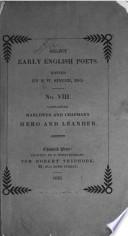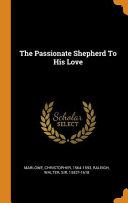Source: Tamburlaine the Great, Part 1
Works

The Tragical History of Doctor Faustus
Christopher Marlowe
The Jew of Malta
Christopher Marlowe
Hero and Leander
Christopher MarloweTamburlaine
Christopher MarloweEdoardo II
Christopher Marlowe
The Passionate Shepherd to His Love
Christopher MarloweFamous Christopher Marlowe Quotes
“Thou hast committed—
Fornication: but that was in another country;
And besides, the wench is dead.”
Friar Barnardine and Barabas, Act IV, scene i
The Jew of Malta (c. 1589)
“Pluck up your hearts, since fate still rests our friend.”
Aeneas, Act I, scene i, line 149
Dido (c. 1586)
“Love me little, love me long.”
Ithamore, Act IV. Quoting John Heywood, "Love me litle, love me long," in Proverbes (c. 1538), Part ii, Chapter ii.
The Jew of Malta (c. 1589)
Christopher Marlowe Quotes about love
“Who ever loved that loved not at first sight?”
First Sestiad. The same statement occurs in As You Like It (1600) by William Shakespeare, and a similar one in The Blind Beggar of Alexandria (1596) by George Chapman.
Hero and Leander (published 1598)
Variant: Where both deliberate, the love is slight; Who ever loved, that loved not at first sight?
“Come live with me and be my Love,
And we will all the pleasures prove”
Source: The Complete Plays and Poems
“He that loves pleasure, must for pleasure fall.”
Evil Angel, Act V, scene iv
Source: Doctor Faustus (c. 1603)
The Passionate Shepherd to His Love (unknown date), stanzas 1 and 2. Compare: "To shallow rivers, to whose falls / Melodious birds sings madrigals; / There will we make our peds of roses, / And a thousand fragrant posies", William Shakespeare, Merry Wives of Windsor, act iii. scene i. (Sung by Evans.)
Christopher Marlowe Quotes about hell
Mephistopheles, Act II, scene i, line 118
Doctor Faustus (c. 1603)
Source: Dr. Faustus
Mephistopheles, Act II, scene i, line 120. In the first line, Marlowe references Isaiah in Isaiah 24:19 and 34:4; in the second line, he references Daniel in Daniel 12:10.
Doctor Faustus (c. 1603)
Christopher Marlowe: Trending quotes
“Now will I show myself to have more of the serpent than the dove”
Barabas, Act II, scene iii. Marlowe is referencing Jesus, "Be ye therefore wise as serpents, and harmless as doves," in Matthew 10:16.
The Jew of Malta (c. 1589)
Context: Now will I show myself to have more of the serpent than the dove; that is, more knave than fool.
First Sestiad
Hero and Leander (published 1598)
“Make me immortal with a kiss.”
Source: Doctor Faustus and Other Plays, Parts 1-2
Christopher Marlowe Quotes
Barabas, Act I, scene i. Paraphrasing John Heywood, "Here lyeth muche rychnesse in lytell space," in The Foure PP https://books.google.com/books?id=LbkVAAAAYAAJ&printsec=frontcover&source#v=onepage&q&f=false (c. 1530).
The Jew of Malta (c. 1589)
Faustus, Act V, scene i, lines 91–93
Doctor Faustus (c. 1603)
Source: The Tragical History of Dr. Faustus
Source: The Tragical History of Dr. Faustus
“What should a priest do with so fair a house?
A prison may best beseem his holiness.”
Gaveston, Act I, scene i, lines 204–205
Edward II (c. 1592)
“Pray for me! and what noise soever ye hear, come not unto me, for nothing can rescue me.”
Faustus, Act V, scene ii, lines 57–58
Doctor Faustus (c. 1603)
“What strange arts necessity finds out.”
Venus, Act I, scene i, line 169
Dido (c. 1586)
“My men, like satyrs grazing on the lawns,
Shall with their goat feet dance the antic hay.”
Gaveston, Act I, scene i, lines 57–58
Edward II (c. 1592)
“I'm armed with more than complete steel,—
The justice of my quarrel.”
Lust's Dominion (c. 1600), Act iii. scene 4. Compare: "Thrice is he armed that hath his quarrel just, And he but naked, though locked up in steel, Whose conscience with injustice is corrupted", William Shakespeare, Henry VI, Act iii. scene 2.
Misattributed
“Religion
Hides many mischiefs from suspicion.”
Barabas, Act I, scene ii
The Jew of Malta (c. 1589)
“My swelling heart for very anger breaks.”
King Edward, Act II, scene ii, line 197
Edward II (c. 1592)
“A pleasant-smiling cheek, a speaking eye,
A brow for love to banquet royally.”
First Sestiad
Hero and Leander (published 1598)
“All women are ambitious naturally.”
First Sestiad
Hero and Leander (published 1598)
“And let these tears, distilling from mine eyes,
Be proof of my grief and innocency.”
Mortimer, Act V, scene vi, line 100
Edward II (c. 1592)
“Things past recovery
Are hardly cured with exclamations.”
Barabas, Act I, scene ii
The Jew of Malta (c. 1589)
“Excess of wealth is cause of covetousness.”
Ferneze, Act I, scene ii
The Jew of Malta (c. 1589)
“Accurst be he that first invented war.”
Mycetes, Part 1, Act II, scene iv, line 1
Tamburlaine (c. 1588)
“Time passeth swift away;
Our life is frail, and we may die to-day.”
Mycetes, Act I, scene i, line 68
Tamburlaine (c. 1588)
“Che serà, serà:
What will be, shall be.”
Faustus, Act I, scene i, lines 47–58
Doctor Faustus (c. 1603)
“Let Earth and Heaven his timeless death deplore,
For both their worths shall equal him no more.”
Amyras, Part 2, Act V, scene iii, lines 252–253
Tamburlaine (c. 1588)
“Our swords shall play the orators for us.”
Techelles, Act I, scene ii, line 132
Tamburlaine (c. 1588)
“It lies not in our power to love or hate,
For will in us is overruled by fate.”
First Sestiad
Hero and Leander (published 1598)
“So, march away; and let due praise be given
Neither to fate nor fortune, but to Heaven.”
Ferneze, Act V
The Jew of Malta (c. 1589)
“I count religion but a childish toy,
And hold there is no sin but ignorance.”
Machiavel, Prologue
The Jew of Malta (c. 1589)
“All they that love not tobacco and boys are fools.”
Remark attributed to Marlowe from the testimony of Richard Baines, a government informer, in 1593.
Disputed
Lust's Dominion (c. 1600), Act iii. scene 4. The first edition attributed the authorship of this play to Marlowe, though this attribution has been recognized as spurious by critics and scholars for nearly two centuries. See Logan and Smith, Predecessors of Shakespeare, p. 32. But compare: "Comparisons are odious", John Fortescue, De Laudibus Leg. Angliæ, Chapter xix.
Misattributed
“Love always makes those eloquent that have it.”
Second Sestiad
Hero and Leander (published 1598)
